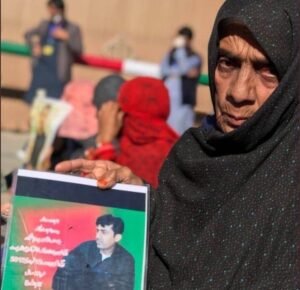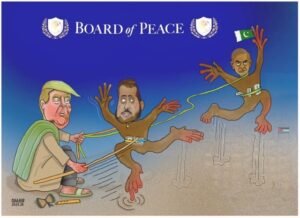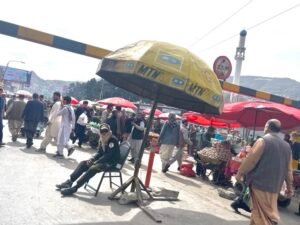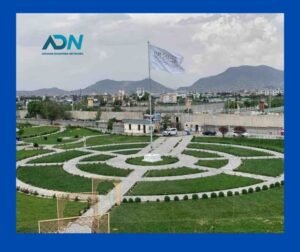Detained and Harassed: Identity Cards No Longer a Shield for Afghan Refugees
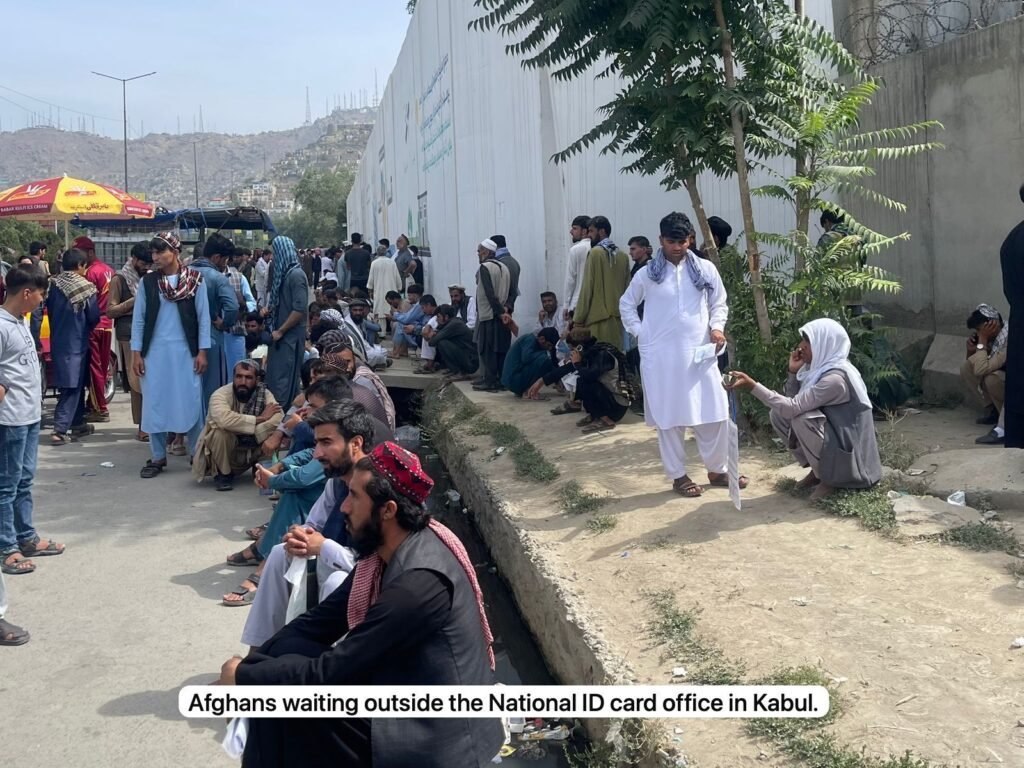
Afghans waiting outside the National ID card office in Kabul. Photo by @AADIL for ADN
By Shinwari
Doubling down on its nationwide crackdown to deport millions of Afghans, Pakistan’s Prime Minister Shehbaz Sharif has given the green light to evict Afghans without papers from the cities of Islamabad and Rawalpindi before March 31, 2025. As a result of the latest order, the Sharif government has devised a plan to move registered Afghan refugees out of Islamabad and Rawalpindi and deport or arrest them.
Since Sept 15, 2023, an estimated 805,991 Afghans have been forcibly deported to their country. As Islamabad issues tough new rules – even for people with identity cards, more than 2 million Afghans in Pakistan could face a new deportation wave.
Thousands of Afghan citizens in Pakistan, many of whom fled following the fall of Kabul to the Taliban in August 2021, now face an uncertain future under a recent government notification.
Afghans awaiting resettlement in third countries will be moved out of Islamabad and Rawalpindi by March 31. Any Afghans who couldn’t be resettled in a third country will also be sent back to Afghanistan.
Many are forced by embassies to wait for months in guest houses in Islamabad while their cases are processed and have reported a rise in harassment by police in recent weeks. Pakistani authorities have also been directed to implement the plan without making any public announcement in this regard.
Reports are pouring in about arbitrary detention and harassment of Afghan refugees and asylum seekers by law enforcement agencies in Islamabad and Rawalpindi.
While the official visa renewal fee is $20, submitting passports through legal channels often results in prolonged confiscation or outright rejection, putting applicants at risk of detention. So Afghans pay visa agents anywhere between 15,000 and 20,000 rupees ($54 to $72) to expedite the process. It used to be valid for six months, but since January this year, the government has only been granting one-month visas.
In a statement issued on January 7, 2025, Afghanistan’s embassy in Pakistan said around 800 Afghans living in the capital have been detained by authorities, including some who are registered with the UN’s refugee agency. Since then, many hundreds have been detained by Pakistani authorities.
The Afghan embassy was “alarmed by reports of unwarranted arrests, home searches, and extortion targeting Afghan nationals”, it said.
Concerns Grow Over Afghan Deportation
As the plan to move Afghans out of Islamabad and Rawalpindi is being implemented, the United Nations Refugee Agency (UNHCR) and the International Organization for Migration (IOM) have expressed concern over the government’s “devised plan” to move registered Afghan refugees out of Islamabad and Rawalpindi. UNHCR and IOM said that the uncertain time frame to plan for a dignified move is compounding a stressful situation, not to mention the immediate impact of such a move on livelihoods and the education of children.
According to a joint statement issued in Islamabad on Feb 5, both organizations urged Pakistan to “implement any relocation measures with due consideration for human rights standards, including due process, and the legal status of Proof of Registration (POR) and Afghan Citizen Card (ACC) holders, who have resided in Pakistan for an extended period”.
Responding to the illegal detention and continuous harassment of Afghans in Pakistan, Amnesty International, in a statement stated:
“The police night raids, harassment and arbitrary detention of hundreds of Afghan refugees, including women and children, in the capital city is part of a larger discriminatory policy against Afghans inside the country.”
Amnesty International has confirmed that Pakistan has taken steps to detain asylum seekers with valid residency documents and visas. According to the organization, the actions of Pakistani authorities have put Afghan refugees at greater risk. The rights body statement stated:
“The Pakistani authorities’ actions are sweeping and discretionary and have resulted in the harassment and detention of refugees even when in possession of valid documents and visas. All refugees and asylum seekers, regardless of documentation status, have the right to due process and protection against forced return in international human rights law.”
Afghan Refugees in Pakistan Face Uncertain Future
The total number of Afghans living in Pakistan with POR and ACC is estimated to be 1.3 million and 700,000, respectively. The purpose of both these cards was to officially recognize the holders as refugees and grant them partial rights in Pakistan’s healthcare and economic sectors. But the reality is that these documents are a mere formality.
In 2022, an analysis of the Afghan refugees’ market systems found that the POR and ACC cardholders could not legally work. Although POR cardholders could open a bank account, the said account would need to be renewed every two years. Moreover, the holders of these cards were not able to open or operate a business in their name.
Even worse off were the undocumented Afghan nationals, who did not have the facility to open bank accounts, launch businesses, or find work in the formal sector of the economy. Hence, they would opt for informal or undocumented labor to sustain themselves, working doubly hard at menial jobs to make ends meet.
The IOM said, hundreds of Afghan nationals were arrested and detained in Islamabad in the last few weeks:
“The overwhelming majority of Afghan nationals in Pakistan are law-abiding individuals, whose situation needs to be seen through a humanitarian lens.”
The statement issued by the UNHCR & IOM state:
“Forced return to Afghanistan could place some people at increased risk. We urge Pakistan to continue to provide safety to Afghans at risk, irrespective of their documentation status.”
Afghan Refugees Stripped of Assets Amid Forced Return
Officially, the Government of Pakistan has only allowed each family to take Rs 50,000 across the border. With this meagre amount, many are at a loss at how they are expected to restart their lives in a strange land. They wish that as they are being forced to leave Pakistan, they are permitted to at least keep their earned goods which they have acquired through hard labor.
Since the crackdown, many of the small shops or businesses owned by the Afghan families have been shut and the Pakistani locals, including the ‘front men’ who are charging the Afghans to document their properties, are brutally extorting them.
Afghans who invested in property or businesses in Pakistan do not have legal cover for the assets. For instance, Sharbat Khan, who has lived in Punjab’s Chakwal district for almost four decades, expressed disappointment with the government’s decision to prevent the refugees from taking their cattle to Afghanistan.
“First, the government forces us to leave our home, where we lived for the past 40 years, and now they forbid us from taking our cattle,” he lamented.
Many others are being wronged by their debtors who are Pakistanis who are not refusing to pay, but delaying the process, emboldened by the vulnerable situation of Afghan refugees under the current crackdown.
Although Pakistan has hosted millions of Afghan refugees, over the past four decades, the country has received billions of dollars in financial assistance from the international community to support these efforts.
UNHCR and other international organizations have provided massive aid to help Pakistan manage the refugee population, which notwithstanding this aid remained on the fringes of society.
Meanwhile, Pakistan has increased the pressure on Afghan refugees in an unprecedented way. In recent weeks, Afghans in various parts of Islamabad have reported that police are searching and detaining migrants “house by house”.
Pakistan authorities continue to disregard the persecution, serious human rights violations and humanitarian catastrophe that await Afghan refugees if deported to Taliban-controlled Afghanistan.
Author chooses a single pseudonym. Shinwari is a freelance journalist based in Peshawar, Pakistan.
Note: The contents of the article are of sole responsibility of the author. Afghan Diaspora Network will not be responsible for any inaccurate or incorrect statement in the articles.





